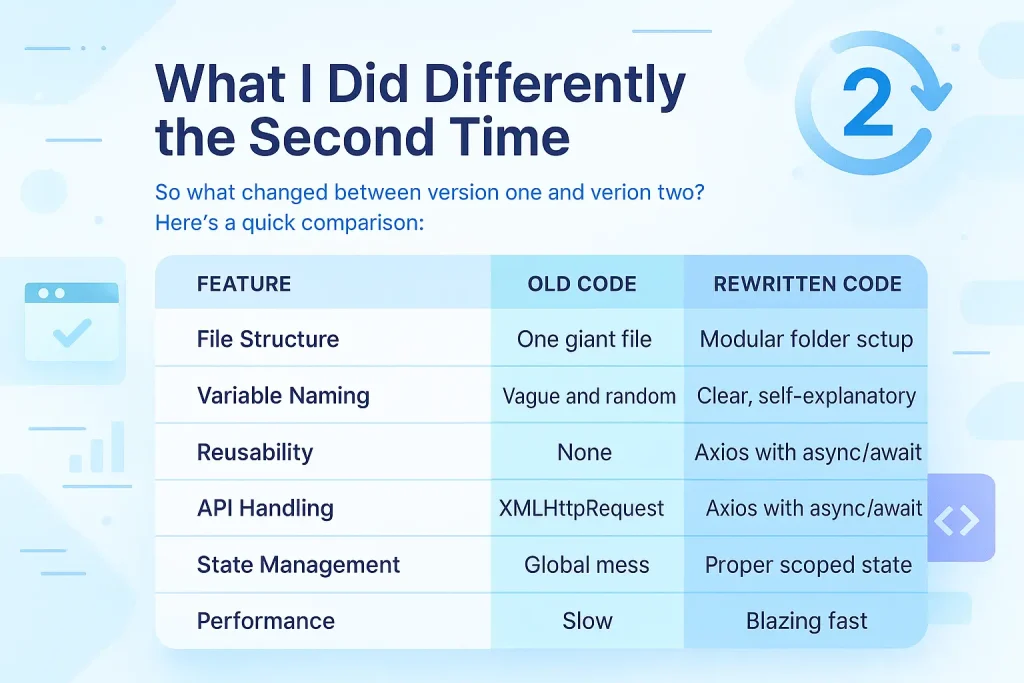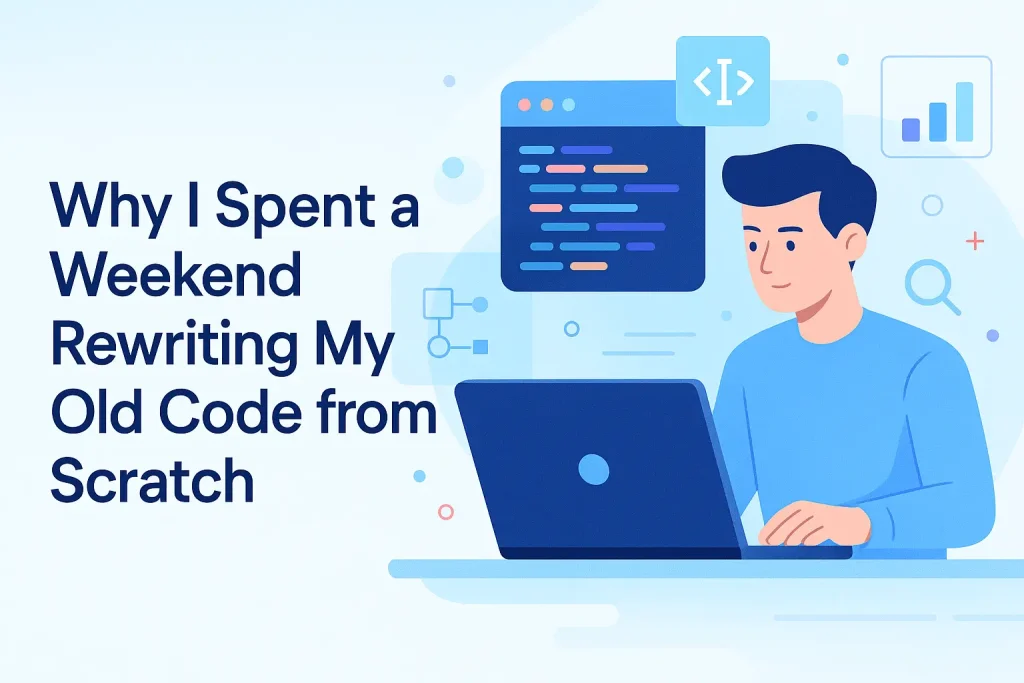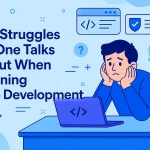Hey, I’m Rifat – a passionate web developer and tool builder who loves creating websites that make life easier for users. So, let me tell you about one random but incredibly fulfilling weekend: I decided to ditch my old spaghetti code and rebuild it all from scratch.
Sounds wild, right? But here’s the thing: rewriting your old code is kinda like cleaning your room. Painful at first. Weirdly satisfying after. This post isn’t just a “what I did” diary though – I want to show you WHY I did it, HOW it changed things, and WHAT you should watch out for if you’re thinking of doing the same.
So grab a drink, and let’s dive into this casually chaotic but super insightful weekend of code rehab.

The Backstory: What Sparked the Weekend Coding Binge?
Let’s rewind a bit. Like many devs, I started learning web development by throwing stuff together. My early projects were built with pure hustle but zero structure. They worked… kind of. But man, maintaining them? Ugh.
One evening, I opened an old tool I built a year ago. It loaded slow, the logic was a mess, and even I couldn’t tell what some parts were doing. That’s when it hit me: I’d become a better developer since writing it. I knew better now. Why was I still relying on code I wouldn’t put on a resume?
That moment sparked a question:
What if I rebuilt it from scratch? Could I do better? Would it be worth the time?
Spoiler: YES. Totally worth it. Here’s why.
When Old Code Becomes a Liability
Let’s be honest – most old code is like a messy closet. You keep cramming things in, ignoring the chaos. But eventually, it spills over. In my case, my old code had issues like:
- Poor naming conventions (what even is
tempVar9??) - No separation of concerns
- Repeated logic that begged to be abstracted
- No comments or documentation
These problems weren’t just annoying. They made debugging impossible, slowed performance, and made feature additions a nightmare. I was fixing bugs that shouldn’t exist. That’s when I realized: This code was holding me back.
So I made a decision: Burn it down (digitally, of course) and start fresh.
The Real Reason I Rewrote My Code: Growth as a Developer
Okay, here’s where it gets real. I didn’t rewrite my code just to make it neater. I did it because I outgrew my old self.
When I first wrote that tool, I barely understood concepts like modular design, async/await, or even how to manage states properly. I was just trying to “make it work.” But fast forward a year? I’d learned best practices, adopted new tools, and refined my mindset.
Rewriting the code was like proving to myself that I had actually leveled up.
Developer Tip: Don’t rewrite code for the sake of rewriting. Do it because you’re now equipped to do it better.
My Approach: Starting with a Clean Slate
This part was tough but freeing.
I opened up a new folder. No copy-paste. No looking back at old files. I wanted a blank canvas.
I asked myself:
- What would I name variables if I were writing this today?
- How would I structure the app using what I know now?
- Which frameworks or libraries are better suited this time?
I even documented the flow in Notion before writing a single line of code. That mental prep saved hours of second-guessing.
And guess what? My app was rebuilt in half the time it took to create the original.
What I Did Differently the Second Time

So what changed between version one and version two? Here’s a quick comparison:
| Feature | Old Code | Rewritten Code |
|---|---|---|
| File Structure | One giant file | Modular folder setup |
| Variable Naming | Vague and random | Clear, self-explanatory |
| Reusability | None | Components everywhere |
| API Handling | XMLHttpRequest chaos | Axios with async/await |
| State Management | Global mess | Proper scoped state |
| Performance | Slow | Blazing fast |
This wasn’t just a facelift. It was a whole brain transplant.
And let me tell you: working with the new code felt like butter.
Lessons I Learned from Rewriting My Code
This wasn’t just a technical exercise. I picked up some valuable life/dev lessons too.
1. Good code grows from good planning. I spent more time thinking than typing, and it paid off.
2. Comments are your future-self’s best friend. Write them. Even if you’re the only reader.
3. Code isn’t sacred. You can break it. You can rebuild it. You SHOULD, sometimes.
4. Experience makes a bigger difference than tutorials. Rewriting showed me how much I really knew.
Should You Rewrite Your Old Code?
Great question. And the answer isn’t always yes. Ask yourself:
- Is this project worth improving?
- Have I significantly leveled up since writing it?
- Would rewriting bring real value to the code and to me?
If it checks those boxes? Go for it. Treat it like a mini hackathon. But if it’s just gonna be a sideways move, maybe just refactor in small chunks.
FAQ: Questions I Had Before Rewriting My Code
Q: Isn’t rewriting everything a waste of time?
A: Not if the old code is slowing you down or hurting your growth. It’s like rebuilding a bad foundation so your house doesn’t fall.
Q: How do I know I’m ready to rewrite something?
A: When the pain of working with the old version outweighs the effort of starting fresh.
Q: What if I make the new version worse?
A: You won’t, because you’re starting with experience. But back up your old code just in case.
Final Thoughts: What That Weekend Gave Me (Beyond Better Code)
Honestly, it felt awesome. That weekend gave me more than clean code. It gave me confidence.
I could finally see my progress in a tangible way. I felt proud, not frustrated. And even better? My users got a smoother, faster experience. That’s a win for everyone.
If you’re sitting on a pile of old code and wondering if it’s time to rebuild: trust your gut. If you feel like you’ve leveled up, then show it. Rebuilding isn’t failure. It’s proof you’ve grown.
Until next time, keep learning, keep building, and don’t be afraid to hit the delete key.
– Rifat



